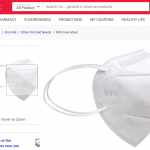
By Zahid H Javali
Prof. Sai Siva Gorthi, Dr Vikram S and Kumari Sonu have developed PPE masks coated with low-cost, biodegradable, nano compounds to repel microbes that can act as potential preventive material during the COVID-19 pandemic. Using the readily-available nano technology, the three-member team at the Indian Institute of Science has achieved a antimicrobial efficiency of upto 99.9% with their nano-fiber mats, according to the lab at Central University of Tamil Nadu. This IISc invention is going to be mass-produced by ShanMukha Innovations, an IISc-incubated startup. Nano masks of varying sizes, including children, will soon be out in two varieties. The first variety will be a PPE mask with nano membranes that can be used for anywhere between one and three months, depending on the usage. However, they cannot be washed and designed as disposable masks. The second variety is a cotton mask with a pouch containing a removable filter, so the mask cloth can be washed and reused. Shanmukha Innovations collaborated with Bangalore-based Maskon to fabricate the PPE and cotton masks with pouch. Besides, the team has also built portable electrospray units that can be applied on any woven and non-woven fabrics to achieve the same antimicrobial efficiency of 99.9%. While the mass manufacture of the masks will happen in a few weeks from now, the electrosprays may take more time.
“The conventional PPE masks can be used for a maximum of one week for heavy usage,” says Vikram. “This is because the pore size becomes larger due to the exposure of environmental pollution. But in the case of our nanofiber membrane mask, it has been sandwiched inside PPE, so people can even use it for three months. But I advise them to use our nano masks for a maximum of two months in case of heavy usage and more than three months in case of mild use. For daily bike riders, it can be done for one month as they are the most exposed to the environment pollution.” Already, 100 free samples of the masks have been distributed to people. One of the recipients was Akhila Kodupurath. “It is a very good concept, and we are rest assured that it is better than other masks in the market,” she says.
Vikram’s team started work in February 2020, but the project reached fruition only by the end of May as the series of validations from the labs took time. His only job now is to transfer the technology to the manufacturer for the mass production of nano compounds, electrospray units and masks. “The nanofiber masks prevent respiratory infections due to airborne microbes and do not compromise the breathability as the coating thickness is less than 0.5 micrometers,” he says. “This mask was used during my recent roundtrip to highly contagious places in Rajasthan and I feel that the nano mask was also one of the important factors that protected me from a COVID infection.”
So what is so good about the mask? The conventional PPE masks repel the respiratory droplets that consist of microbes. However, some micro particles can enter the mask in case of airborne infection. Here is where the nano coating in the second and fourth layer act as an additional shield. So what is a nano fiber? “It is a really fine fibre that is 1000-times smaller than human hair, and made from a combination of biodegradable non-toxic polymers with excellent antimicrobial properties,” says Vikram. “The nanofibers are 100% non-toxic. Additionally, a protective fabric layer has been given to prevent direct contact of the nanofibers with your skin.”
However, the nanofibers are specifically designed to act as filters for the mask to minimize the pore size existing in woven and non-woven fabrics. “They should not be used for other purposes,” says Vikram. “Separate products may be designed in the future for other applications, such as wiping, that require antimicrobial surfaces coatings.”






